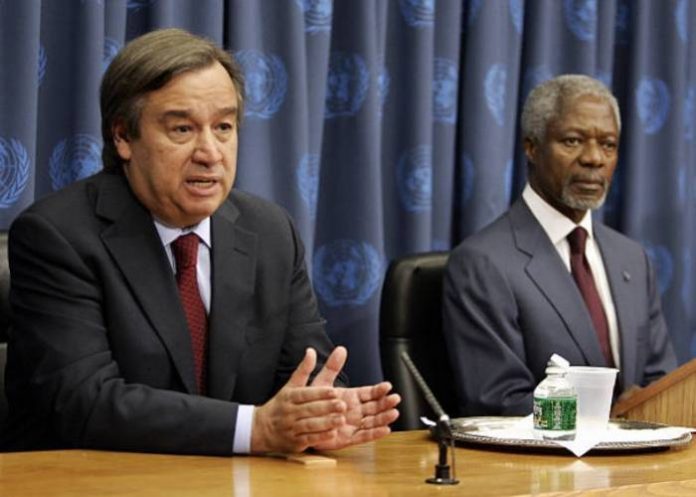UN Secretary General Antonio Guterres has opened the floodgates of tribute for one of his predecessors, Kofi Annan who died today in Geneva.
In a statement, Guterres described Annan as a guiding force for good.
“It is with profound sadness that I learned of his passing. In many ways, Kofi Annan was the United Nations. He rose through the ranks to lead the organisation into the new millennium with matchless dignity and determination”, Guterres said.
“Like so many, I was proud to call Kofi Annan a good friend and mentor. I was deeply honoured by his trust in selecting me to serve as UN High Commissioner for Refugees under his leadership.
“He remained someone I could always turn to for counsel and wisdom — and I know I was not alone. He provided people everywhere with a space for dialogue, a place for problem-solving and a path to a better world.
“In these turbulent and trying times, he never stopped working to give life to the values of the United Nations Charter. His legacy will remain a true inspiration for all of us.
“My heartfelt condolences to Nane Annan, their beloved family, and all who mourn the loss of this proud son of Africa who became a global champion for peace and all humanity”.
Annan’s death was announced today by his foundation.
He died after a brief illness, the foundation.
The Ghanaian was the second African to head the UN after Egypian Boutrous Boutrous Ghali, who was in charge between January 1992 to December 1996.
His tenure as UN secretary-general coincided with the Iraq War and the HIV/Aids pandemic.
After serving for 10 years at UN, Annan served as the UN special envoy for Syria, leading efforts to find a peaceful solution to the conflict.
Kofi Annan described his greatest achievement as the Millennium Development Goals which – for the first time – set global targets on issues such as poverty and child mortality.
Annan was born in Kumasi Ghana on 8 April 1938. After studying at Kwame Nkrumah University, he went on to study economics at Macalester College, international relations from the Graduate Institute Geneva and management at MIT.
He joined the UN in 1962, working for the World Health Organisation’s Geneva office. He went on to work in several capacities at the UN Headquarters including serving as the Under-Secretary-General for peacekeeping between March 1992 and December 1996.
He was the first UN Secretary General to be appointed from within the organisation’s bureaucracy.
His first marriage was to Nigerian Titi Alakija, from 1965 to 1983. After the marriage collapsed, he married Nane Maria Lagergren in 1984.
He is survived by his wife, Nane and three children, Kojo, Ama and Nina






